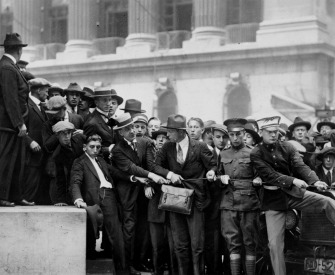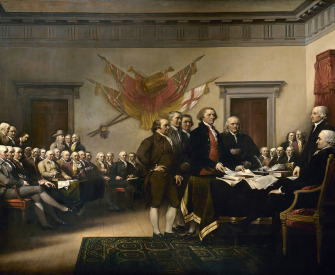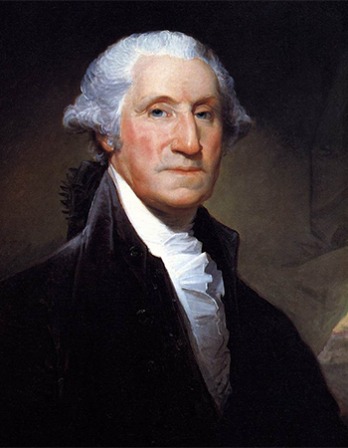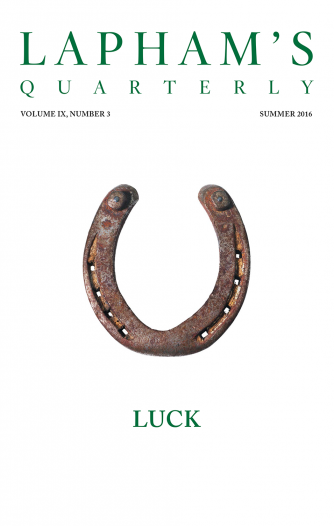If the people be the governors, who shall be governed?
—John Cotton, 1636Remember the Ladies
Angelina Grimké advocates for the almighty power of the petition.
Dear Friend,
I come now to that part of thy book, which is, of all others, the most important to the women of this country; thy “general views in relation to the place woman is appointed to fill by the dispensations of heaven.” I shall quote paragraphs from thy book, offer my objections to them, and then throw before thee my own views.
Thou sayest, “Heaven has appointed to one sex the superior and to the other the subordinate station, and this without any reference to the character or conduct of either.” This is an assertion without proof. Thou further sayest that “it was designed that the mode of gaining influence and exercising power should be altogether different and peculiar.” Does the Bible teach this? “Peace on earth and goodwill to men is the character of all the rights and privileges, the influence and the power of woman.” Indeed! Did our Holy Redeemer preach the doctrines of peace to our sex only? “A man may act on society by the collision of intellect, in public debate; he may urge his measures by a sense of shame, by fear, and by personal interest; he may coerce by the combination of public sentiment; he may drive by physical force; and he does not overstep the boundaries of his sphere.” Did Jesus, then, give a different rule of action to men and women? Did he tell his disciples, when he sent them out to preach the gospel, that man might appeal to the fear and shame and interest of those he addressed and coerce by public sentiment and drive by physical force? “But that all the power and all the conquests that are lawful to woman are those only which appeal to the kindly, generous, peaceful, and benevolent principles?” If so, I should come to a very different conclusion from the one at which thou hast arrived. I should suppose that woman was the superior, and man the subordinate being, inasmuch as moral power is immeasurably superior to “physical force.”
Thou sayest, “All the generous promptings of chivalry, all the poetry of romantic gallantry, depend upon woman’s retaining her place as dependent and defenseless, and making no claims and maintaining no rights but what are the gifts of honor, rectitude, and love.”
What dost thou mean by woman’s retaining her place as defenseless and dependent? Did our Heavenly Father furnish man with any offensive or defensive weapons? Was he created any less defenseless than she was? Are they not equally defenseless, equally dependent on Him? What did Jesus say to his disciples when he commissioned them to preach the gospel? “Behold, I send you forth as sheep in the midst of wolves; be ye wise as serpents, and harmless as doves.” What more could he have said to women?
Again, she must “make no claims and maintain no rights but what are the gifts of honor, rectitude, and love.” From whom does woman receive her rights? From God or from man? What dost thou mean by saying her rights are the gifts of honor, rectitude, and love? One would really suppose that man, as her lord and master, was the gracious giver of her rights, and that these rights were bestowed upon her by “the promptings of chivalry and the poetry of romantic gallantry”—out of the abundance of his honor, rectitude, and love. Now, if I understand the real state of the case, woman’s rights are not the gifts of man—no! Nor the gifts of God. His gifts to her may be recalled at his good pleasure—but her rights are an integral part of her moral being; they cannot be withdrawn; they must live with her forever. Her rights lie at the foundation of all her duties. And so long as the divine commands are binding upon her, so long must her rights continue.
“A woman may seek the aid of cooperation and combination among her own sex, to assist her in her appropriate offices of piety, charity,” etc. Appropriate offices! Ah! Here is the great difficulty. What are they? Who can point them out? Who has ever attempted to draw a line of separation between the duties of men and women, as moral beings, without committing the grossest inconsistencies on the one hand, or running into the most arrant absurdities on the other?
“Whatever, in any measure, throws a woman into the attitude of a combatant, either for herself or others—whatever binds her in a party conflict—whatever obliges her in any way to exert coercive influences, throws her out of her appropriate sphere.” If by a combatant, thou meanest one who “drives by physical force,” then I say man has no more right to appear as such a combatant than woman, for all the pacific precepts of the gospel were given to him, as well as to her. If by a party conflict, thou meanest a struggle for power, either civil or ecclesiastical, a thirst for the praise and the honor of man, why, then I would ask, Is this the proper sphere of any moral, accountable being, man or woman? If by coercive influences, thou meanest the use of force or of fear, such as slaveholders and warriors employ, then I repeat that man has no more right to exert these than woman. All such influences are repudiated by the precepts and examples of Christ and his apostles, so that, after all, this appropriate sphere of woman is just as appropriate to man. These “general principles are correct” if thou wilt only permit them to be of general application.
According to what thou sayest, the women of this country are not to be governed by principles of duty but by the effect their petitions produce on the members of Congress, and by the opinions of these men. If they deem them “obtrusive, indecorous, and unwise,” they must not be sent. If thou canst consent to exchange the precepts of the Bible for the opinions of such a body of men as now sit on the destinies of this nation, I cannot. What is this but obeying man rather than God, and seeking the praise of man rather than of God?
Another objection to woman’s petitions is that they may “tend to bring females, as petitioners and partisans, into every political measure that may tend to injure and oppress their sex.” As to their ever becoming partisans, i.e., sacrificing principles to power or interest, I reprobate this under all circumstances and in both sexes. But I trust my sisters may always be permitted to petition for a redress of grievances. Why not? The right of petition is the only political right that women have. Why not let them exercise it whenever they are aggrieved? Our fathers waged a bloody conflict with England because they were taxed without being represented. This is just what unmarried women of property now are. They were not willing to be governed by laws which they had no voice in making; but this is the way in which women are governed in this republic. If, then, we are taxed without being represented, and governed by laws we have no voice in framing, then surely we ought to be permitted at least to remonstrate against “every political measure that may tend to injure and oppress our sex in various parts of the nation, and under the various public measures that may hereafter be enforced.” Why not? Art thou afraid to trust the women of this country with discretionary power as to petitioning? Is there not sound principle and common sense enough among them to regulate the exercise of this right? I believe they will always use it wisely. I am not afraid to trust my sisters—not I.
Thou sayest, “In this country petitions to Congress, in reference to official duties of legislators, seem in all cases to fall entirely without the sphere of female duty. Men are the proper persons to make appeals to the rulers whom they appoint,” etc. Here I entirely dissent from thee. The fact that women are denied the right of voting for members of Congress is but a poor reason why they should also be deprived of the right of petition. If their numbers are counted to swell the number of representatives in our state and national legislatures, the very least that can be done is to give them the right of petition in all cases whatsoever, and without any abridgement. If not, they are mere slaves, known only through their masters.

Angelina Grimké
From Letters to Catharine E. Beecher. Born in 1805 in Charleston, South Carolina, to a slaveholding family, Grimké moved in 1829 to Philadelphia, where she and her sister Sarah became involved in the Quaker community and the abolitionist movement. In 1837 the educator Catharine Beecher—sister of Harriet Beecher Stowe—wrote an essay, addressed to Grimké, objecting to women’s participation in abolitionism. “Men are the proper persons,” argued Beecher, “to make appeals to the rulers whom they appoint.” Grimké responded in a series of thirteen open letters, later compiled into this work.




